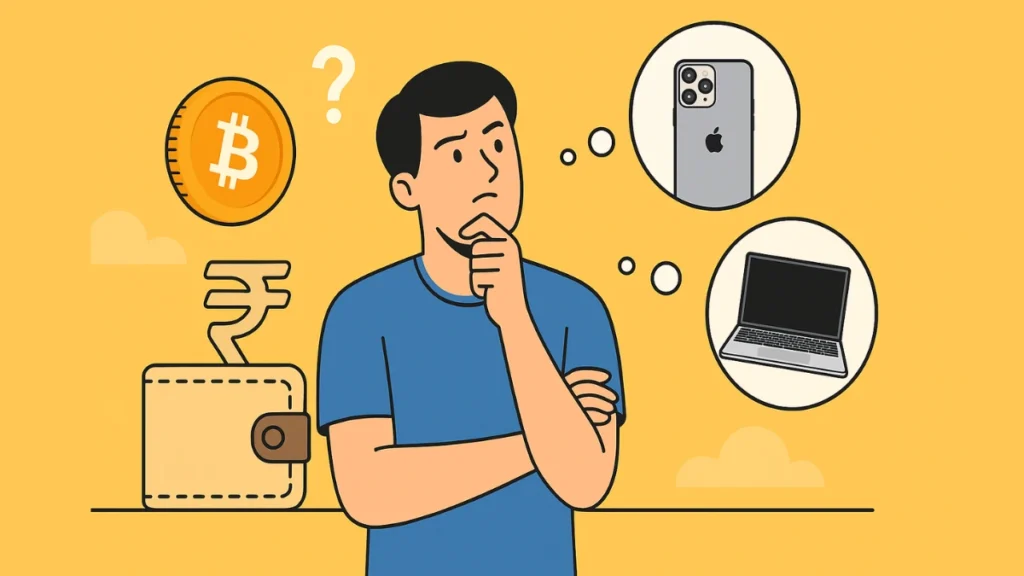Planning to buy a MacBook from the U.S. or latest iPhone in India with your crypto earnings? A Redditor recently asked a common yet crucial question:
“I have $2,500 in my Binance wallet. I’ve been using Binance P2P for 2–3k INR with no issues. What’s the best way to convert it?”
In this article, we’ll break down all the practical and legal ways to use or convert your crypto without triggering bank freezes or falling into tax traps.

Option 1: Binance P2P — The Most Common Route
How It Works:
- Open the Binance app or website.
- Go to P2P trading and select Sell > USDT > INR.
- Choose a verified buyer with high completion rates.
- Transfer your USDT and receive INR in your bank.
Pros:
- No conversion fees
- Real-time INR settlements
- Convenient and quick
Risks:
- Bank scrutiny for large transfers
- Possible account freeze or “lien” due to flagged crypto-related activity
If you’re new to Binance P2P, here’s a full walkthrough on how to use Binance P2P safely with step-by-step screenshots.
Note: To understand common risks, see our breakdown of Binance P2P scams and how to avoid them.
Option 2: CoinDCX or WazirX – The Safe & Tax-Compliant Way
If you’re okay with being tax-compliant, this method is your safest bet.
How It Works:
- Register on an Indian exchange like CoinDCX or WazirX.
- Transfer your USDT from Binance to this exchange wallet.
- Sell USDT for INR on the platform.
- Withdraw INR to your bank account.
Pros:
- Legal and regulated
- Avoids bank scrutiny
- Comes with customer support
Cons:
- 1% TDS will be auto-deducted
- 30% flat tax on any gains
- KYC and PAN mandatory
Having trouble with your account? Learn what to do if your CoinDCX account gets locked.
For deeper tax details, we’ve covered everything about crypto P2P taxation in India, including legal compliance, TDS filings, and income declaration.
Option 3: Use Gift Cards or Direct Crypto Payments
If you don’t want to convert to INR, spend your crypto directly.
Gift Cards:
Platforms like Bitrefill, Coinsbee, or CryptoRefills allow you to:
- Buy gift cards for Best Buy, Amazon (US), Croma, Flipkart
- Pay using USDT, BTC, ETH
Direct Crypto Payments:
Some third-party sellers or crypto-based ecommerce platforms may accept USDT and ship internationally. However:
- Check for legitimacy
- Ensure international warranty is included
If you’re looking to store or spend your crypto securely, check out our picks for the best crypto wallets for beginners.
P2P vs Exchange: Which One Is Safer?
| Method | Pros | Cons |
|---|---|---|
| Binance P2P | Fast, competitive rates | Risk of account freeze if misused |
| CoinDCX/WazirX | Compliant, direct to bank | Tax cuts reduce final payout |
| Gift Cards/Crypto Pay | Spend without conversion | Limited use cases, warranty challenges |
Final thoughts
If you’re dealing with a small chunk (under ₹50,000), Binance P2P is still a convenient option, just choose verified merchants and avoid suspicious remarks during transfers.
For larger amounts like $2,500 (₹2.15+ lakh):
- Prefer CoinDCX or WazirX for safe and tax-aware conversion.
- Want to spend abroad? Try gift cards or international crypto vendors, but verify everything before paying.
Looking to reinvest instead of cashing out? You can also explore how to set up a profitable Bitcoin mining rig as an alternative.
Key Takeaways
- Use Binance P2P cautiously — avoid flagged accounts or shady buyers.
- CoinDCX/WazirX is your go-to for legal and safe crypto-to-INR conversion.
- Gift cards and direct purchases are viable for tech buyers abroad.
- Be fully aware of tax laws — crypto income is taxable in India, even for P2P.
Got questions or crypto conversion experiences to share? Drop them in the comments below.
Disclaimer:
The information provided in this article is for educational and informational purposes only. Fdaytalk does not provide financial, investment, or legal advice. Cryptocurrency trading and conversions are subject to regulatory risks, including tax obligations and banking restrictions in India. Please consult with a qualified financial advisor or tax professional before making any decisions involving digital assets.

